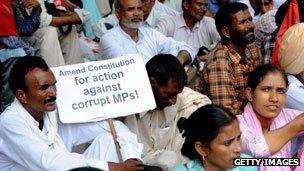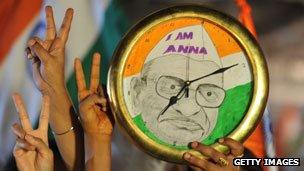India's vibrant anti-corruption activists
- Published

Indians have long demanded reform
Mock funerals, "skeleton rallies" and barricading bureaucrats in their offices - India's anti-corruption campaigners are finding new ways to express their discontent.
Indian democracy: one man, one bribe. Salman Rushdie's famous quip has rarely been more apposite.
The scale of corruption in modern India is astounding. The size of bribes and kickbacks is enormous, the stories of corruption astonishing, and the audacity of corruption's big players ever more apparent. India has become a great power, but it has done so without washing away the canker of corruption.
An alleged scam involving second generation (2G) mobile phones in India last year involved government officials accused of undercharging telephone companies for licences, in return for bribes. Auditors estimated a cost to the exchequer of US$39bn.
Corruption is everywhere, from the organisation of the Commonwealth Games to match fixing, from getting a driving licence to getting a divorce. Everyone is playing the game. Indeed, some wise commentators have argued that there is no such thing as corruption in India because what people in the West define as corruption is simply ordinary life in the subcontinent.
But we should beware of wise commentators. Because what's also remarkable about modern India are the efforts of people to protest against corruption. In India people define corruption in the same way as sociology professors: "the abuse of public office for private gain". It is mistaken to think that people in India just accept corruption as common sense.
'Anna movement'
This year it has been the north Indian social activist "Anna" Hazare who has hit the headlines for his anti-corruption crusade. Hazare launched a hunger strike in April this year in Delhi demanding that the state establish a new ombudsman - a "Lokpal" - to deal with corruption at high levels of government. Volunteer organisations, prominent Indian intellectuals and legal activists quickly weighed in.
A co-ordinated "Anna movement" has been the result. Anti-corruption has gone online. And there have been dramatic street protests too. For some, this is nothing less than India's Arab Spring.
There's something refreshing about this upsurge of anti-corruption activity - and also something disturbing. As some left-wing critics are now pointing out, there's a danger that anti-corruption activists will throw the baby out with the bath water. Youth where I work in Uttar Pradesh point out that you can criticise politicians as much as you like, but at least they have been elected. Indeed, many are now seeing the Anna movement something of a corporate conspiracy.
Big capital can use anti-corruption as a cover for pushing forward its own agenda, which is to privatise and deregulate, come what may. And it's perhaps telling that the Anna movement has not criticised the "corruption" of big corporations lobbying the Indian government.
Be all this as it may, what isn't in doubt is the vibrancy of anti-corruption organising in India at every level: on the main drags in New Delhi to the smallest village courtyard. There's the daily spectacle of labourers trudging to offices to complain. There are social reformers who write long letters to the newspapers to berate government officials. And there are student activists across India who have been known to barricade bureaucrats in their offices for days at a time - "teaching them a lesson" they say.
I have worked with many of these everyday reformers, young men usually underemployed and in their 20s, who spend their days buzzing between offices, meetings and newspaper offices, publicising cases of corruption and making the maximum fuss. These are semi-professional whistleblowers.
Perhaps the most interesting example of anti-corruption comes from a corner of rural eastern Uttar Pradesh. It was here in 1976 that a poor 15-year-old called Lal Bihari decided to go on the warpath. In that year Bihari's land was seized by an unscrupulous uncle. The uncle bribed government revenue officers to register Bihari as deceased. But Bihari didn't take this lying down. He quickly complained to officials. His appeals went unheeded.

Supporters of Anna Hazare have held rallies
But Bihari still persisted. In an extraordinary move he stage-managed a mock funeral for himself to publicise his case. Bihari quickly discovered that others had suffered the same fate, and so he launched a campaign on behalf of the many thousands of people in Uttar Pradesh who have been illegally declared dead.
Bihari's Dead People's Society ("mritak sangh" in Hindi) petitions on behalf of victims of corruption. It organises regular "skeleton rallies" in north Indian cities.
The Mritak Sangh has succeeded in bringing hundreds of people back to legal life, restoring to them their land and pride. It just goes to show, of course, that there is more than one way of being reincarnated in India.
But the serious point is that corruption is not taken for granted in India. Things can change.
How to listen to From Our Own Correspondent:
BBC Radio 4: A 30-minute programme on Saturdays, 1130.
Second 30-minute programme on Thursdays, 1100 (some weeks only).
Listen online or download the podcast
BBC World Service:
Hear daily 10-minute editions Monday to Friday, repeated through the day, also available to listen online.
Read more or explore the archive, external at the programme website, external.